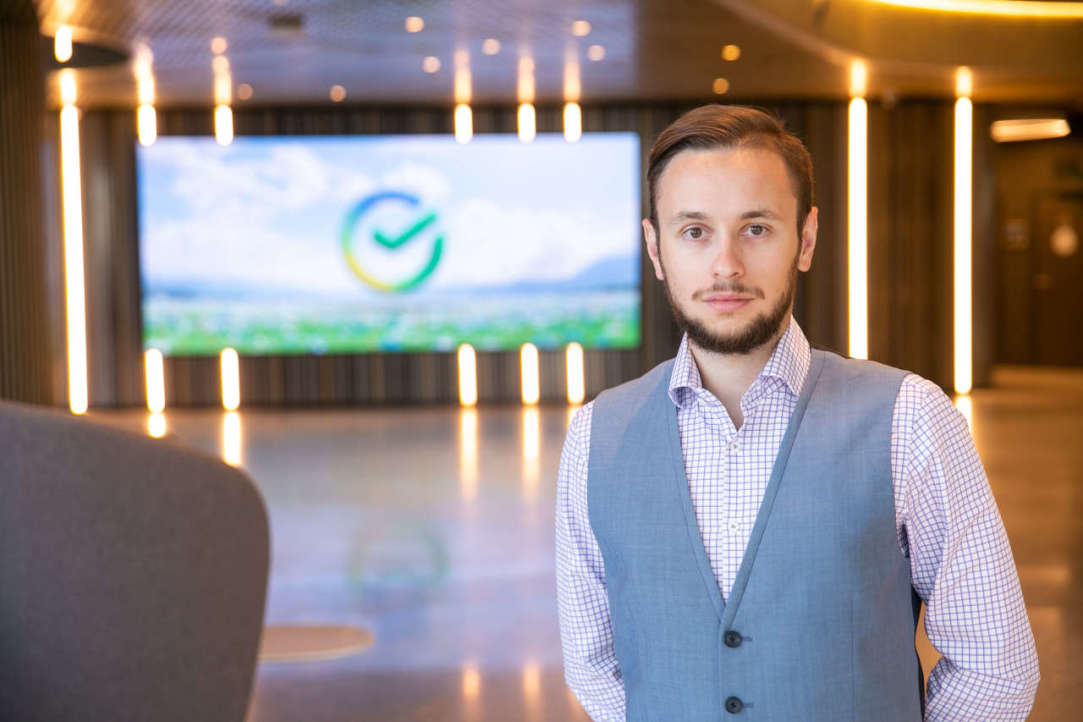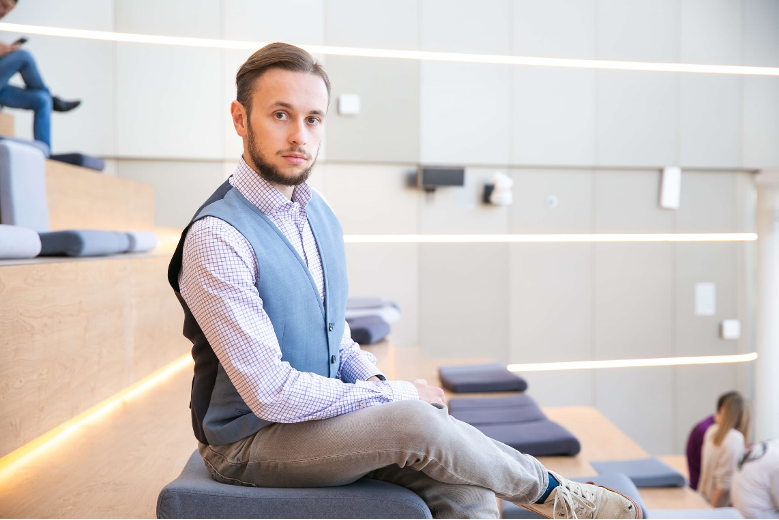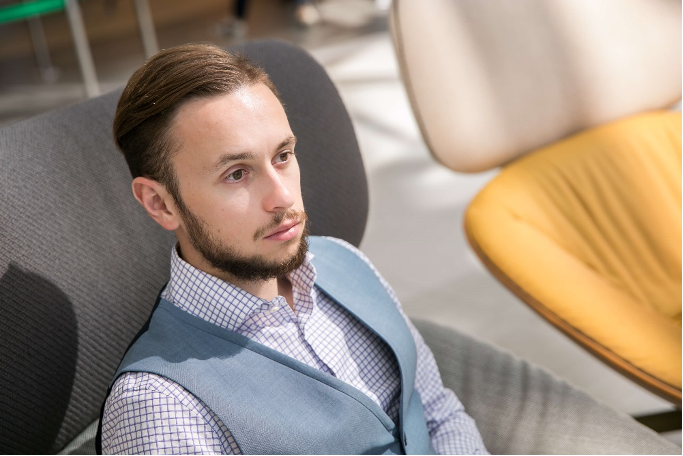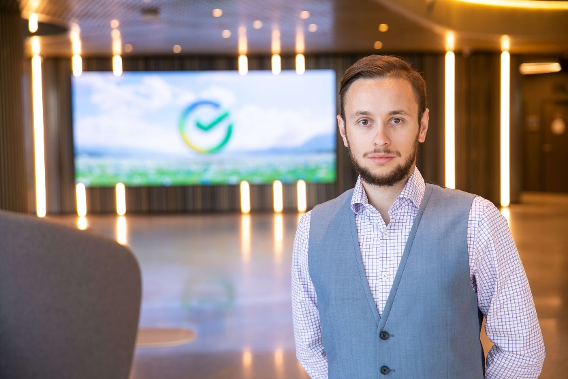"HSE Engages You With A Community That Can Unlock Your Leadership Potential"

Russia’s largest bank is no longer a bank but a diverse ecosystem of products and services which came into being thanks to Sber AI Transformation Centre. In this interview, Nikita Khudov, an alumnus of HSE ICEF and currently Executive Director at Sber AI, tells about the benefits of using artificial intelligence, how sport can make us better performers, and why doing a double degree is worth it.
How did you become interested in economics while a school student?
I can’t say I took a lot of interest in economics while a school student. Many high school graduands don’t seem to have a clear idea of what they want to do next, and it’s often our parents who make the choice for us. I was no exception. With little if any idea about my future career, my goal was that of getting a good degree. My father helped me out – and I am very grateful to him for that – when he reached the people who knew about universities and education and got them talk to me. They all pointed to HSE as the only competent provider of economics and business education in Russia.
We had a long talk about ICEF and I decided to go to its Open Day. What I heard from graduates about the study and the role their degree had played in their careers got me interested and convinced I was about to make the right choice. With good career prospects, ICEF’s international atmosphere sounded inspiring. Well, they also mentioned the highly demanding curriculum – and that proved true – but I’ve always known how to benefit from overcoming challenges, so I was absolutely sure about my choice.
What kept you going when you were faced with those challenges?
The people around me, my fellow students. Now as an alumnus, while speaking before prospective students at the recent Open Day I talked about why learning environment matters. There are demotivating cases of students looking for ways to get their degree without putting too much effort. In this sense, the students of ICEF are the exact opposite. At ICEF, there is increased motivation to learn. ICEF students are inquisitive because they want to succeed in their future jobs and they see knowledge as what can help them build their future. They are eager to learn and to act, making you want to look up to them and become an achiever, too. I find this to be the best motivation to start setting yourself high standards early in life, when you are a college student.
What was your professional pursuit and what new roles did you try yourself in?
I had always wanted to try entrepreneurship. I launched my startup as early as my first year of study. The company was known under the name of MSKS and it specialized on organizing go-kart races and a whole line of motor racing events. Sport event entrepreneurship looked refreshingly offbeat and I started it as soon as I found myself among like-minded people.
It’s remarkable how HSE encourages you to turn opportunities into action to achieve the most ambitious of your goals
I became passionate about karting even before enrolling in ICEF. Participated in the Russian Karting Championship. When I found out about the many specialized sports clubs available at HSE, I thought why not start HSE karting team? There were no karting competitions among universities at that time – a great omission. So, I approached one of the vice-rectors with the proposal for HSE karting competition and that was how we established the HSE Karting Cup.
With one hundred student signatures as an endorsement for my initiative, I started that first karting competition with the support from HSE and, later, the HSE karting club with regular training and competition schedules. And then we moved that initiative to the next level – interuniversity karting competitions of national level.
Can sport make one a better student?
It can help one get better at everything. For me, sport is about three main things. The first and most important one is goal-setting and staying focused on results. I mean competitions here. Working on your fitness is different – it doesn’t challenge you – whereas real sport is about competing with your rivals and, more importantly, fighting your own weaknesses. Sport motivates you to achieve more and perform better as a student or entrepreneur. Sport builds good habits. It builds a winning attitude, otherwise why compete? And this instinct to win and be the best drives me to do better in all other areas of life.

The second thing is discipline. Sport teaches you to stay organized. If you plan to grow as a sportsman, you need to be able to organize your training schedules and adjust your life accordingly. Sport made me a better time manager. I was able to combine my studies with working multiple jobs and physical trainings.
And, thirdly, sport helps me relax and take my mind off work. Switching the type of activity from mental to physical helps well in this. Alternating intellectual activities with physical exercise is always good. The intellectual fatigue you feel at the end of a hard day can be emotionally draining or give you a hard time falling asleep. But a short workout can help to let go of whatever’s burdening you, so that you can wake up to start new day with renewed vigour.
What soft skills does this university cultivate in the first place?
I see soft skills as what can be built by people on their own, based on their personal pursuits. As an HSE student I made full use of the opportunity to test and improve my skills by participating in case championships. HSE engages you with a community where you can compare yourself with others, give input, lead or be an excellent performer or team member. It was through teamwork that we worked to improve our skills, with case championships as an excellent opportunity to level up all sorts of qualities. I learned how to build my public speaking skills – the skills that proved very important in my future career.
Proactivity and desire to be the best are in the air, making HSE a special community of individuals
They make HSE a great place for achieving a coherent progress as a student and as individual through communication.
What's interesting about communication within HSE community?
I’d say, meetings with alumni. They form a very important part of the university life here. I myself stay in touch with ICEF by regularly participating in events such as Open House. ICEF offers multiple career events which involve notable graduates as guest speakers. With experience in many different industries, they come to talk about their career paths and can share life hacks that cannot be learned from an outside source. This student-industry dialogue evolves nurtured by open to communication, and that’s exactly what gives it value and uniqueness.
They are a firsthand source of how things work in the workplace. And their success stories are a source of motivation for others, infusing the student community with lasting inspiration. It’s not summer plans ideas or fancy parties that they come to talk about, but real career opportunities and promising internships. The HSE community is the one that helps, nourishes, and incentivizes you to develop your career. This is one the coolest things about HSE and its tradition. It’s what sets HSE students apart from others.
Your CryptoAlpha project, how did you come up with the idea for it?
I started CryptoAlpha in 2017 while doing my degree at IE Business School in Madrid. It’s a small boutique investment firm and it was able to maintain its investment in cryptocurrency market at a sufficiently high level. We were a team of ten – more than enough for a business like ours – where my role was that of a fund raiser who went to conferences and negotiated with investors. We turned CryptoAlpha into a full-fledged investment fund that specialized on the then trending cryptocurrency field.
Our portfolio had three main elements: algorithmic trading, venture investments and a mining farm, the latter still working successfully and with good profit. Running that project had been a unique experience for me, with many useful things to learn, of which the most essential one is that I gained the skills needed for investment management.
About Nikita:
A member of the ICEF class of 2016, Nikita Khudov earned his double master’s – Master in Management and Master in Business Analytics and Big Data – from IE Business School (Madrid). In 2017, Nikita founded CryptoAlpha, a boutique investment firm specializing on decentralized finance, and served as senior consultant at Bain & Company between 2018 and 2021.
Nikita Khudov holds the title of Candidate Master of Motor Sports. He is an Ironman triathlon competition finisher and a finalist of European Poker Tour. Nikita currently holds the position of Executive Director at Sber AI.
Unlike my previous role as a sporting events manager, CryptoAlpha was about attracting and managing investors’ funds, communicating with parties involved, and making competent investment decisions. Professionally speaking, running your own business is an extremely useful and exciting thing. Because you are personally engaged, you learn to cope with obstacles, which means faster growth and experience with every minor detail of your business.
Running CryptoAlpha had been a full-time job until I got an offer from Bain. I had long wanted to try consulting, so I used my chance. We downscaled CryptoAlpha to personal finance management to serve basically my personal and my friends’ needs.
Why did you decide to study business abroad?
I chose to do my master’s abroad because I wanted to become a real pro, more versatile, with fresh perspectives “from the overseas”. My reasoning was that work could wait and that if I was ever going to have the time for master’s it was then. But mostly I wanted to receive new soft skills – and what better place could I choose than a European school? Schools in Europe are known for their opportunities for personal growth and development, and their master’s programmes are designed to cultivate them in the first place, unlike Russian schools. My choice of the programme and the country was governed largely by my need to improve my presentation skills and to experience teamwork in a multicultural environment.
Why did the IE Business School programme look an interesting choice?
There were several Master in Management programmes I was choosing from. IE Business School offered a double degree and I thought, “Why not repeat my experience and pursue two programmes in parallel?” One conferred a Master in Management degree and the other a choice of options. I chose the Master in Business Analytics and Big Data. With courses from basic programming in different languages to Big Data tools to machine learning modeling, it was a good fit for me. Another thing I liked about it is the wider vision that it offered on the commonly faced challenges from the perspectives of technology and business – something that came in very handy in my line of work.

Doing the Master in Management after ICEF was an easy job, to be honest. The reason is simple: ICEF has really strong courses in economics, finance, and banking – the for learning management. As for the Master in Business Analytics, I was completely new to it and therefore did have hard time learning. At the same time, I passed the CFA Level 1 exam almost effortlessly, although it is considered a big challenge by many.
You started your career in consulting industry. Why consulting?
Going into consulting seems to be the most beneficial thing a fresh graduate can think of. Consulting is where you’ll be dealing with a diverse range of business activities, since the Big Three consulting firms are working will all sorts of industries from petroleum to FinTech.
Retail, public services, aviation, investment funds and tourism were just some of the areas I was dealing with at Bain
Your exposure to this diversity will furnish you with vast experience. You will learn the economic side of running different businesses – an invaluable career asset – and will gain the general understanding of business operations and economic phenomena. Unlike IB with its focus on finance, the consulting industry offers a variety of tasks. So, the choice was pretty obvious. My job at Bain had given me as much of hands-on experience as there can be.
Also, consulting is where you can be tasked with running multiple things in parallel. You may have to immerse yourself into finance to elaborate a marketing strategy whilst exploring technological side of oil production. There have been a number of truly challenging analytical projects in my practice, that encompassed the whole range of digital economy issues including machine learning.
Why did you decide to move to Sber and join its AI team? How advanced should one’s tech skills be for landing a job in AI?
The tech skills I received during my master’s study had proven sufficient enough to qualify me for the digital technology career. While at Bain, I received a lucrative job offer which I couldn’t say ‘no’ to because it was in AI – the area I had developed an interest in. And because some of the projects I worked on at Bain related to digital technologies, and particularly AI, I had to do some extra learning and had thus become quite an expert who got noticed by the clients. That’s how I ended up in SBER.
My domain has little to do with the technological side of AI applications in banking. Nor does it involve model building, although I am well aware of all the technicalities and can tackle them all right. I am more into the management side. The task before my department is to transform the business using the AI applications for banking.
What changes can AI induce in businesses and how does the scale up of AI drive profit?
AI is being used across many industries. AI makes data based decisions, replacing humans and being the core of workflow automation. Take, for instance, credit scoring models: Reviewing of loan requests from retail customers is done by AI, not credit officers.
Loan decisions are AI-powered. There is a dedicated algorithm for that
With access to diverse datasets, this algorithm issues the most optimal decision and if it’s positive calculate the loan rate. Also, AI offers an excellent tool for bulk recruitment, first collecting data on each specific candidate and them evaluating their qualifications and issuing the decision as to hire or not. Examples of AI applications for data-based decision-making are infinite.
Sber is using AI in almost all its functions and most of its products. Its ecosystem, i.e. non-banking services like marketplaces, is AI-powered and growing sustainably. One perfect example of AI-powered platform is SberMegaMarket – a great time saver for the users of its website or app because it uses the AI to recommend those products that the users really need, sparing them the hours of scrolling through the lists of products until the finally find what they are looking for.
Or take another example: SberSound. It gained in popularity after the international providers left Russia. Being a rapid absorber of AI, music streaming recommends the music that the user wants to hear. AI’s task can be broadly defined as making apps as highly customized to their users’ needs as possible. The users want to know that their needs are known and that the app is no time-waster. Sber AI has done a great job promoting its bank’s services, and there will soon be new uses of AI that promise a performance boost.
Sber’s ecosystem has turned it into an impressive minimarket. Can you explain what ecosystem in banking is?
Sber was created as a rebranded Sberbank to operate as an ecosystem of flexibly integrated marketplaces and services under the brand of Sber. As markets welcome digitalization, their traditional services are undergoing change. While classical banks are turning to fintech to move their financial services online, there are marketplaces like Ozon or Yandex that are starting their own banks to acclimate to changes in consumer needs. In the case of larger corporations like Sber, the idea is to step beyond the bounds of traditional service provision and be able to cover all the vital needs of the client.

Sber wants to accompany its customers in everything they do and whenever they face the need to make a decision. While breaking into new industries drives our profits, it generates some benefits for our clients: with one platform to source services and get better offers, the clients enjoy, among other things, personal financial benefits. The more a person uses our ecosystem, the more data the AI receives on him and the better are recommendations that it gives to him. Suppose he made a purchase on SberMarket or was listening to music on SberSound. Next time he goes to Okko he immediately gets his film recommendations. This is exactly what the ecosystem concept builds on – the seamless data-based decisions from AI. It’s a win-win situation for the client and the company.
If bank is an ecosystem, what skills can students be advised to improve if they want to work in it?
No matter the future digital evolution of the traditional banking institutions, we will still need competent finance specialists. Techniques like structured thinking – which can be learned for instance in consulting or by participating in case championships – will always be an asset to business departments, analytics teams and strategy units. Structured communication forms an archi-vital part of any team of specialists. What’s also important is analytical thinking skills, data management skills, and ability to generate data-based decision. True, there are things that AI still cannot do, but the trend is for decision-making to be data-driven.
Candidates who wish to join Sber AI Transformation should be sufficiently knowledgeable about the AI industry, current data management technologies and their operating principles. AI transformation employs data scientists and business specialists, but, in any case, skills such as programming, advanced mathematics and statistical analysis are a must in this line of work.